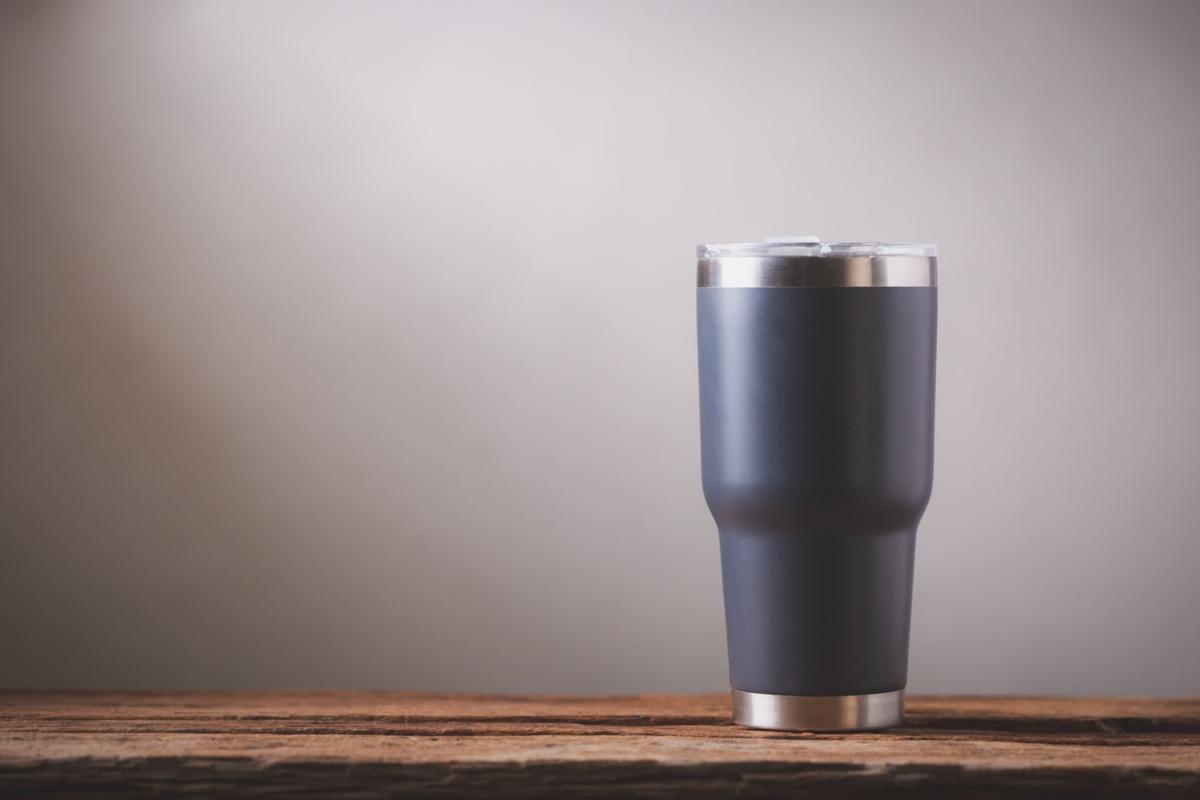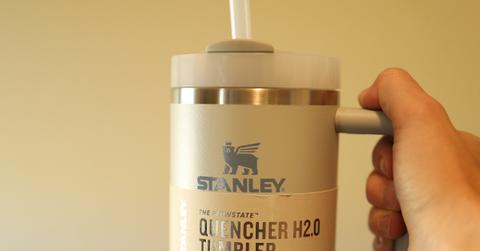Are Stanley Cups Safe to Use? Brand Explains Why the Viral Tumblers Contain Lead
Updated Jan. 26 2024, 2:37 p.m. ET
We all want products that make it easier to live sustainably and healthfully, like reusable water bottles, but what they're made of is important. After conducting a lead test, one woman claimed her Stanley cup contained lead, and could potentially cause lead poisoning in her 3-year-old child, prompting her throw the tumbler away.
Social media regularly adds to consumer worries over metal drinking containers from brands like Stanley as people move away from disposable containers.
Stanley is a beverage container brand founded back in 1913, named for inventor William Stanley Jr. Its vacuum-insulated stainless steel cups were built to keep hot beverages hot longer. In 2023 and early 2024, the cups have had a revival, with people fighting to the death for Stanley's limited releases.
We'll examine the lead poisoning claims and let you know the skinny on lead in the viral Stanley tumblers.

Do Stanley cups have lead?
Yes, Stanley cups do contain lead.
"Our manufacturing process currently employs the use of an industry standard pellet to seal the vacuum insulation at the base of our products; the sealing material includes some lead," Stanley's FAQ section reads. "Once sealed, this area is covered with a durable stainless steel layer, making it inaccessible to consumers."
TikTok user Mils, or @m1l522, posted an angry video in August 2023 showing her Stanley cup testing positive for the presence of lead. The video, which has since been deleted, shows her swabbing the bottom of a Stanley cup. Part of the accompanying text says, "Stop using Stanley and get your bottles tested."
As The Daily Dot reported, the part that Mils tested in her viral TikTok was the piece that covers the particular area on the bottom of the cup. The worrisome issue is that her bottle did not appear to be have the lead part covered, which is when issues can arise.
However, Stanley — as well as various experts — assert that the risk of lead poisoning could only be an issue if the cup breaks.
Can you get lead poisoning from Stanley cups?
Yes, you could be exposed to lead poisoning from a Stanley cup if the cup's base cap accidentally comes off.
On Stanley's website, the brand explains that the lead used in Stanley cups is sealed away from the customer, and cannot cause lead poisoning unless the base cap of the cup comes off — in which case, customers can get a free replacement.
"Rest assured that no lead is present on the surface of any Stanley product that comes into contact with the consumer nor the contents of the product," Stanley's FAQ section reads.
Ronnie Levin, a former EPA scientist and current Harvard University teacher, explained to TODAY.com that he doesn't see any risk in owning a Stanley cup, unless the base cap falls off.
“Though lead poisoning is unlikely to happen from a single instance, if a child puts the bottom of one of these cups against their mouth or rubs the surface with their fingers and then puts them in their mouth, contamination can occur,” he explained.
Touching or breathing in lead is enough to cause lead poisoning.
As explained by the Cleveland Clinic, touching or breathing in lead can in fact cause lead poisoning. So, if the base cap of your Stanley cup comes off, stop touching and using it immediately.
People of all ages can suffer from lead poisoning, but it's most concerning when it affects children 6 and under, since they are growing and developing, per the Cleveland Clinic.
In January 2024, a spokesperson for Stanley told TODAY.com that the company is "making progress on innovative, alternative materials for use in the sealing process."
According to the brand Ohelo, most stainless steel beverage cups use a lead solder, but Ohelo is fully lead-free. While lead is nothing to joke about, you can decide whether you feel safer with a completely lead-free cup, or if you feel OK using a Stanley and keeping an eye on the cover at the bottom.
Is there a recall on Stanley cups due to lead?
There's been a recall on cups due to lead, but not for the Stanley brand. In 2023, the AP reported a knockoff of Stanley cups issued a recall due to excessive lead levels. The manufacturer Soojimus recalled its Cupkin brand double-walled stainless steel children's cups. Products affected were sold on Amazon and the Cupkin website.
According to Cupkin's recall statement, the double-walled cups in 8-ounce and 12-ounce sizes could "pose an unacceptable exposure to lead if the cup bottoms are mistreated." Products purchased from 2020 until Feb. 19, 2023, are affected. Cupkin issued a voluntary recall after receiving customer complaints and conducting further testing.
Stanley isn't the only brand that uses toxic metals in its production. One TikToker, @5dlightshow3, posted a video stating he gave up drinking carbonated beverages from his Yeti cup after a health workup found "traces of metal in my kidneys, liver, and spleen."
Currently, there is no lead warning on Yeti tumblers.
This article, originally published on Sept. 11, 2023, has been updated. Additional reporting by Sophie Hirsh.
